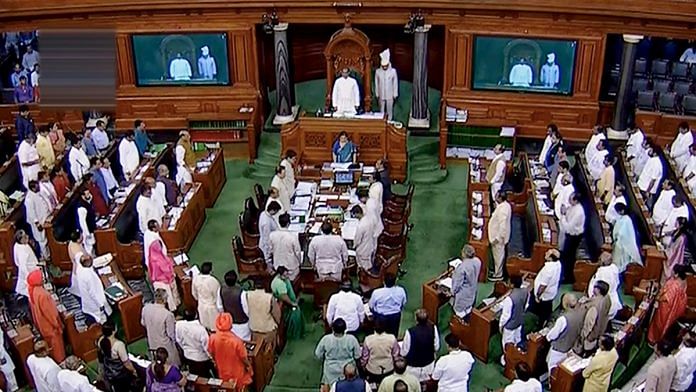New Delhi: Lok Sabha on Tuesday passed the Wages Code Bill that will enable introduction of minimum wage for every worker besides addressing issues like delay in payment to employees.
The Code on Wages Bill, 2019, which seeks to amend and consolidate the laws relating to wages and bonus and matters connected therewith, will benefit 50 crore workers, Labour Minister Santosh Kumar Gangwar said.
The Bill which was passed by voice vote subsumes four labour laws — Minimum Wages Act, Payment of Wages Act, Payment of Bonus Act and Equal Remuneration Act. After its enactment, all these four Acts would be repealed.
Gangwar said that while drafting the bill, the government has accepted 17 out of the 24 recommendations made by the Standing Committee which had scrutinised the similar bill introduced inthe previous Lok Sabha.
As per the bill, the tripartite committee comprising representatives of trade unions, employers and state government would fix a floor wage for workers throughout the country, Gangwar said, adding “minimum wage will become right of every worker.”
In addition to other things, the Bill will effectively address the problems relating to delay in payment of wages whether on monthly, weekly or daily basis, the Minister said.
The Code universalises the provisions of minimum wages and timely payment of wages to all employees irrespective of the sector and wage ceiling.
At present, the provisions of both Minimum Wages Act and Payment of Wages Act apply on workers below a particular wage ceiling working in Scheduled Employments only.
The floor wage will be computed based on minimum living conditions, benefiting about 50 crore workers across the country.
At present there are 12 definitions of wages in the different Labour Laws leading to litigation besides difficulty in its implementation.
The definition has been simplified in the Bill and is expected to reduce litigation and also reduce compliance cost for employers.
The Code on Wages Bill was earlier introduced in Lok Sabha on August 10, 2017 and was referred to Parliamentary Standing Committee which submitted its Report on December 81, 2018.
However, owing to dissolution of 16th Lok Sabha, the Bill had lapsed. Therefore, a fresh Bill was drafted after considering the recommendations of the Parliamentary Standing Committee and other suggestions of the stakeholders.
Initiating the debate on the Bill, Congress member K Suresh alleged that the bill was aimed at benefiting the corporate and not workers, and was a reflection of the “indifferent attitude of the government”.
Even RSS-affiliated trade union Bharatiya Mazdoor Sangh (BMS) had opposed the Wages Code, he said, adding the enactment of the bill will result in labour unrest and disturb industrial peace.
Saugata Roy (TMC) said that workers were struggling to save the existing benefits from employers who themselves are feeling stressed on account of policies of the government.
Supriya Sule (NCP) said that the government has failed to pay wages of BSNL and MTNL employees and the Code on Wages Bill, 2019 is an eyewash.
Pallab Lochan Das (BJP) said the issue will address the issue gender disparity.
Jayadev Galla (TDP) said the government should synchronise the MNREGA and the minimum wage.
Others who spoke in the discussion include Virendra Kumar (BJP) and D Ravikumar (DMK).
Also read: How a 40-day dharna over minimum wages in Rajasthan resulted in the RTI Act




The u turn was not taken by CRPF as an organization, the decision was taken only by the parachute officers “the top brass of this elite Force” who are heading the Force. The decision was taken to please few of the IPS Officers, ignoring the sentiments of thousands of cadre officers. Matter need to be investigated… decision of reversal simply indicates the colonial mindset of these self centred people.. hopeful that Justice will prevail. this act itself has removed the mask from these double standard people.
Support Capf officer
Ye 2 kode ke ips forces krab kr rahe h
Justice for capf
Capf ki mai bhot respect krta hu capf hamre pure India ke internal security krte hai inko justice milna chaiye
Boder se lke internal security of India sb Capf sambl rahi h agr capf na ho tho hamra country kx din bhi survive nahi kr pyege
Ips ek no. Ke corrupt or ayyash hte h ye log paramiltary m maze krne ate h posto p or marte capf ke officer h or ( ips or cpaf officer) dono equal group A gazted officers h koi bda chota nahi h enme.
Support or justice for Capf
Wrna ye ips kise din hamre desh ke security krab kr dge inko jldi se jldi bagoo forces se
Ips bht corrupt or aayaash hte hai
Presently the IPS officers are just appointed as DGs ,IGs in CAPF without any previous experience in the force . This is called parachuting. Centre should make it mandatory for IPS officers to do 2/3 tenures as SP, DIG in each CAPF to learn the operations and ethos of the force. Today they are considered outsiders. As such none of them them has the expertise to head such organisations as of today. DG post is only a pre retirement sop for IPS. As a head one must be acquainted with the hard core operations and not just PR and North block circuit.